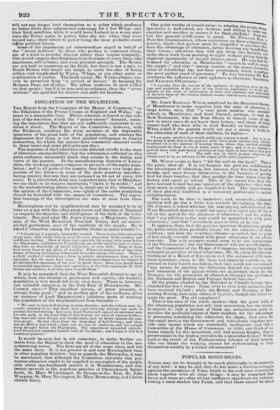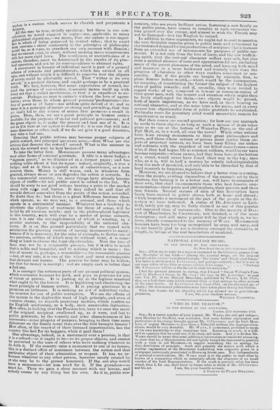POPULAR MONUMENTS.
THERE may not be thought to be much philosophy in monuments of any kind : it may be said, they do but make a fruitless struggle against the operations of Time, which in the end must overwhelm them together with all other things : it may be remarked that brass and stone are after all but inefficient expedients for substan- tiating a mere shadow like Fame, and that there cannot be much
tom which serves 0 cherish and perpetuate a in a cus wee delusion. delusion.
All tbio ntay be true, strictly speaking ; but there is one con- sideration we would suggest in reply—one. applicable to many losophical objections: we mean, that our nature is too imper- fectadmit of being governed by perfect rules; that to exact f from customs a strict conformity to. the principles of philosophy onld be as it were, to overdraw our own account with Reason ; e that we cannot exist, in short, without making many compromises with her more rigid laws. The worthiness or unworthiness of a custom, therefore, must be determined by the results of its prec- t
ise' operation, and not by its correspondence spondence to abstract rules.
A monument in honour of individual merit s part of a general scheme of rewards and punishments, which has existed in all -gee and without which it is difficult to conceive how the objects of eviety could be effectually served. That "virtue is its own reward," is a poetical dictum, and ought perhaps to be a practical truth. we find, however, that some expectation of reward, be- yond the privacy of conscience, insensibly mixes itself up with every act that is called meritorious, or that it is expedient to en- courage. Perhaps no man is entirely without the love of appro- bation; even those in whom grosser passions 'predominate—the love of power or of lucre—are seldom quite devoid of it: and in many it is a principle of nature so strong awl pervading, that they are easily led to any course of action that promises a result in praise. Here, then, we see a great principle in human nature available for the purposes of moral and political government; and the great object is, to make the utmost and best use of it. It is not as if it were at our option to discard it; it is one that will take some direction or other, and, if we do not give it a good direction, ems take a bad one.
ranting that public actions may become proper subjects of public reward, two principal questions arise.—first, What are the actions that deserve the reward? second, What is the manner in which the reward may be best bestowed?
To take the latter first. Monuments possess many advantages ever other forms of national gratitude. A title is a mere badge, a "signum pecori,' as we illustra'ed in a former paper; and has nothing noble about it but its name : indeed, originally, it was a badge; and as it then required acts of subservience, so it now receives them. Money is still worse, and, in whatever form granted, always more or iess degrades the action it rewards. In this commercial country, too many things have already become objects of traffic—let not public merit be added to the list. We should be sorry to see good actions bearing a price in the market along with eggs and butter. It may indeed be said that all rewards detract somewhat from the purity of the action rewarded. No doubt they do; but there is a great difference between those which operate, as we may 'say, in a sensual, and those which operate in a sentimental manlier. Whatever has a tendency to substitute the objects of sentiment for those of sense, will be hailed by all virtuous minds; and to the philosophical legislator in this country, such will ever be a matter of prime concern, since it is one the accomplishment of which is wanting, in a peculiar manner, to the respectability of the national cha- racter. It is on this ground particularly that we regard with satisfaction the growing custom of raising monuments to merit : because if it is necessary, for the sake of example, to flatter one of two passions, neither of which may be without taint, it is some- thing at least to choose the least objectionable. Now the love of fame may not be a reasonable passion, but it is akin to much that is noble and beautiful, and to nothing which is mean : the love of money is, perhaps, a reasonable—a too reasonable passion —but, at any rate, it is one of the vilest and most contemptible that obscures our nature. The passion for fame may be hollow, but that for money is corrupt ; and an empty cask is better than a foul one.
It is amongst the rottenest parts of our present political system, which commutes honours for gold, and pays in pensions for acts of valour or genius. It is putting up as the highest standard what ought to be the lowest. It is legalizing and chartering the worst principle of human nature. It is paying greatness by a premium on littleness. It is making an act of individual virtue the occasion for one of public corruption. We see the effects of this system in the deplorable want of high principle, and even of common shame, as regards pecuniary matters, which confers on the English aristocracy, as a body, such unenviable distinction. How often, in looking over the Pension-list, have we seen the merit of the original recipient swallowed up, as it were, and lost to public gratitude, by the voracity and utter shamelessness of his successors—some progeny of paupers, bringing ill their time more dishonour on the family name than ever the first brought honour ! Bow often, at the renewal of their licensed importunities, has the country blushed for its beggars, while it paid them!
One advantage, indeed, in a monument over a pension, is that it is confined—as it ought to be—to its proper objects, and cannot be perverted to the uses of others who have nothing whatever to do with it. If the country raise a monument to one of its heroes, this is a distinct affair of sentiment between the nation and that Particular object of their admiration or respect. It has no re- ference whatever to any other person, however nearly related he or she may be to the person honoured. If the son also would have a monument—let him work for it. If the grandson—so must he. Thus we gain a clear account with our heroes, and nobody comes by any thing but his own. As it is, public eco-
nomists, who see every brilliant action fastening a new family on the public purse, have reason to tremble at each successive vic- tory gained over the enemy, and almost to wish the French may not be damaged—lest the English be ruined. In addition to these arguments, we ought not to omit to mention the very desirable impulse given to public taste and refinement by t he increased demand for the productions of sculpture like:y to ensue from an extended use of monuments for purposes of public me- morial.. It is not only from the love of lucre, and the low traffick- ing spirit, that the national character suffers repr web, but also from a marked absence of taste and appreciation for art, excluding many of the purest pleasures of the mind, and keeping both mind and manners in a more backward and winterly state than the
progress of education in other ways renders consistent or sea- sonable. But if the people are taught by example, first, to place honour before wealth,—which would be the consequence, we conceive, of constituting the former the subject of the highest class of public rewards: and if, secondly, they were invited to regard works of art, composed in honour or comin..?m 'ration of their great men, with the respect and attention wheel might then be fairly challeng,ed for them,—two objects would be gained, both of much importance, as we have said, in their bearing on national character, and at the same time a far purer, and in every respect less objectionable form of public gratitude be established. Particular cases for pecuniary relief would meanwhile remain for consideration as usual.
But then comes our second question; for how car, any approach be made to these objects as long as such a misuse of stone takes place as we see at the bottom of Waterloo Place, or the end of Pall Mall, or, in a word, all over the town? While other nations have been raising monuments to their great philosophers and poets, and those whose actions or genius must render them ob- jects of perpetual interest, we have been busy filling our niches and columns with the stupidest of our fellow countrymen—men who, if they had begun life as common soldiers, would never have
become corporals—whose names, had they been born at the bottom of a street, would never have found their way to the top; men
who, as it is, will in half a century be utterly indistinguishable from the mob of mankind, and only able to be identified by dint of hard research in forgotten registers. However, we are pleased to believe that a better time is coming, wheu the people, availing themselves of the example set by their masters, but turning it to a better use, will have monuments of their own, that shall commemorate those who best deserve corn- tnemoration—their poets and philosophers, their patriots and their true friends. Several statues of men of this description have
lately been erected in public places, both at home and abroad.; which bespeaks a movement on the part of the people in the di-
rection we have indicated. A statue of Dr. JOHNSON in Lich- field, lately put up, may be fairly claimed as one of this popular and improved class of monuments. One to the memory of DAL- TON of Manchester, by CHANTRET, now finished, is of the same description ; and still more pepular will be that which is, we be- lieve, already commenced to the memory of W err. Monumental honours have been too long monopolized by army and navy, atid. we are heartily glad to see a diversion amongst the statuaries, at length, in favour of' the real benefactors of mankind.



























 Previous page
Previous page